牛津上海版(试用本 Module 2 Unit 4 Numbers Reading2课件(共16张PPT)
文档属性
| 名称 | 牛津上海版(试用本 Module 2 Unit 4 Numbers Reading2课件(共16张PPT) |
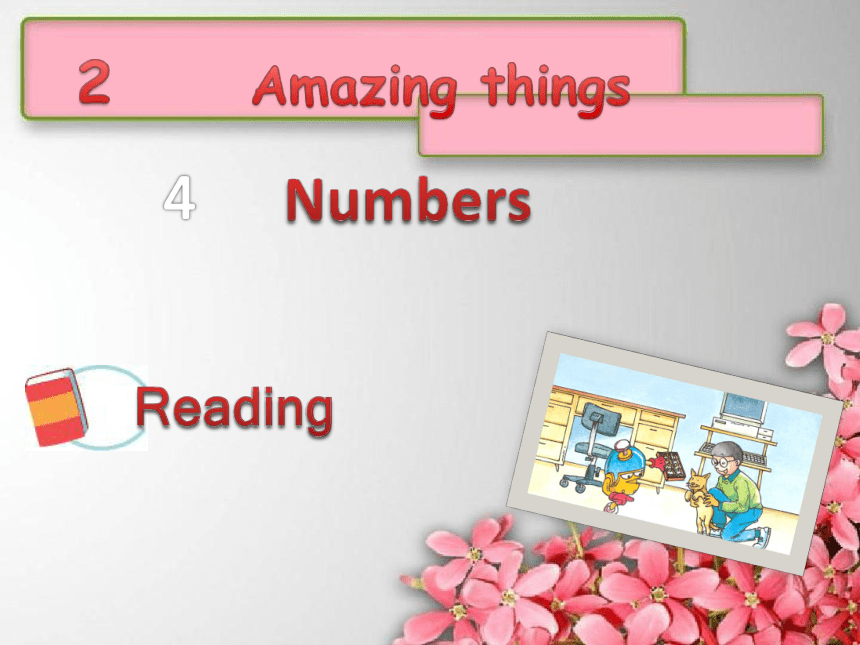
|
|
| 格式 | pptx | ||
| 文件大小 | 4.2MB | ||
| 资源类型 | 教案 | ||
| 版本资源 | 牛津上海版(试用本) | ||
| 科目 | 英语 | ||
| 更新时间 | 2023-09-12 13:56:51 | ||
图片预览

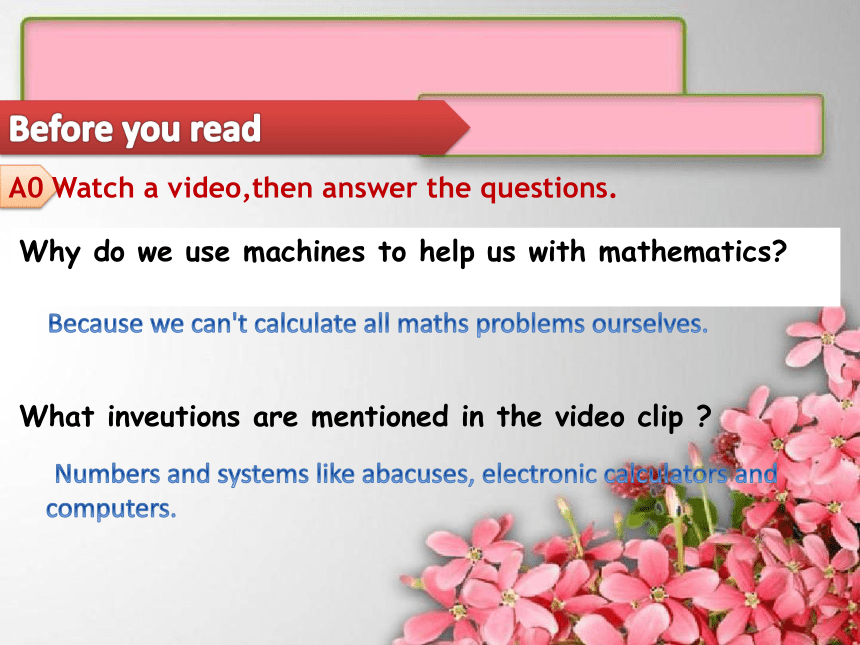
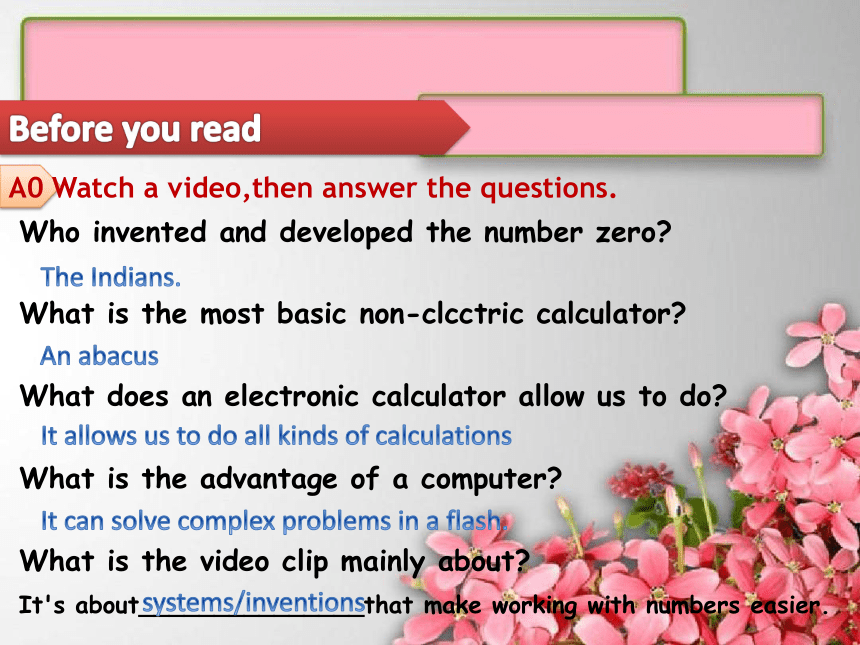

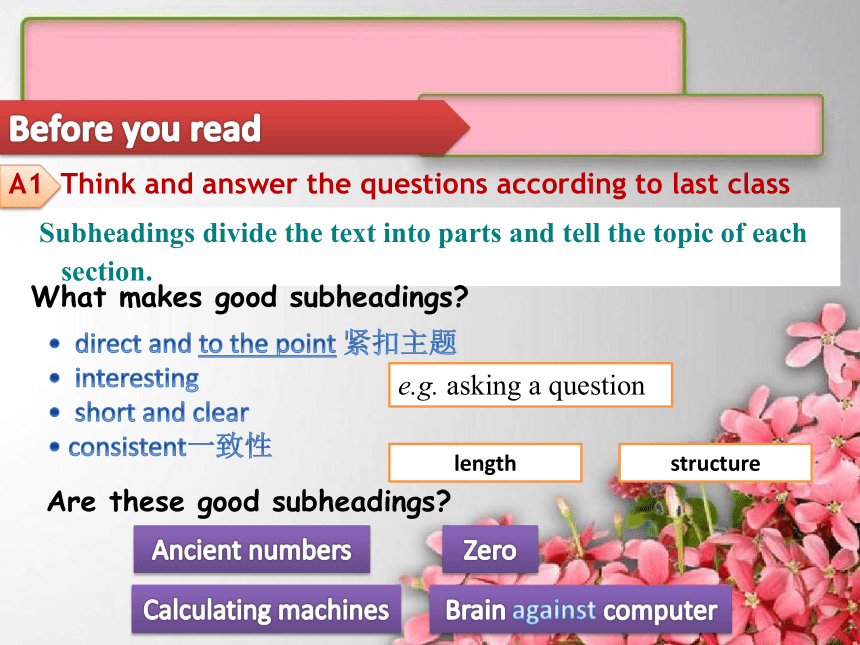
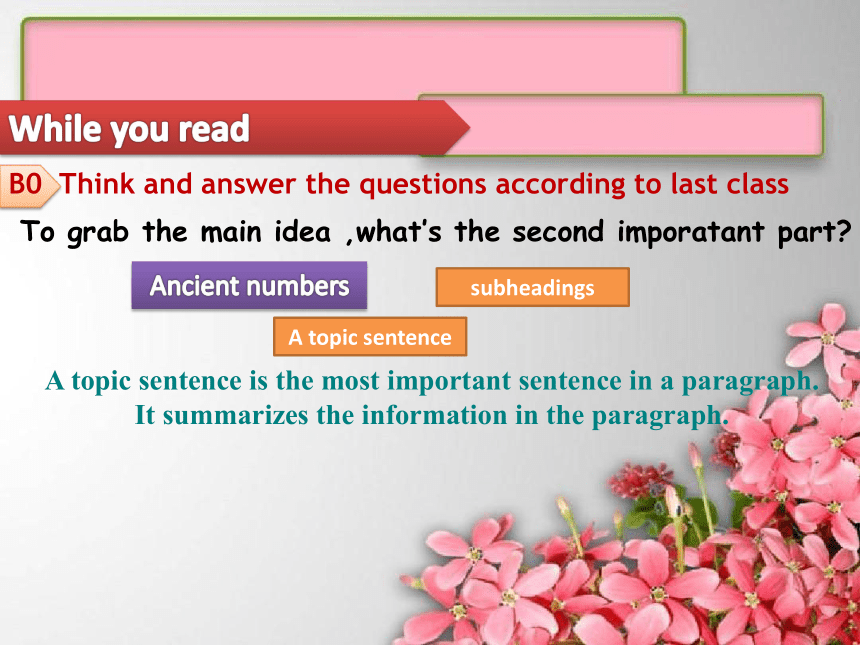
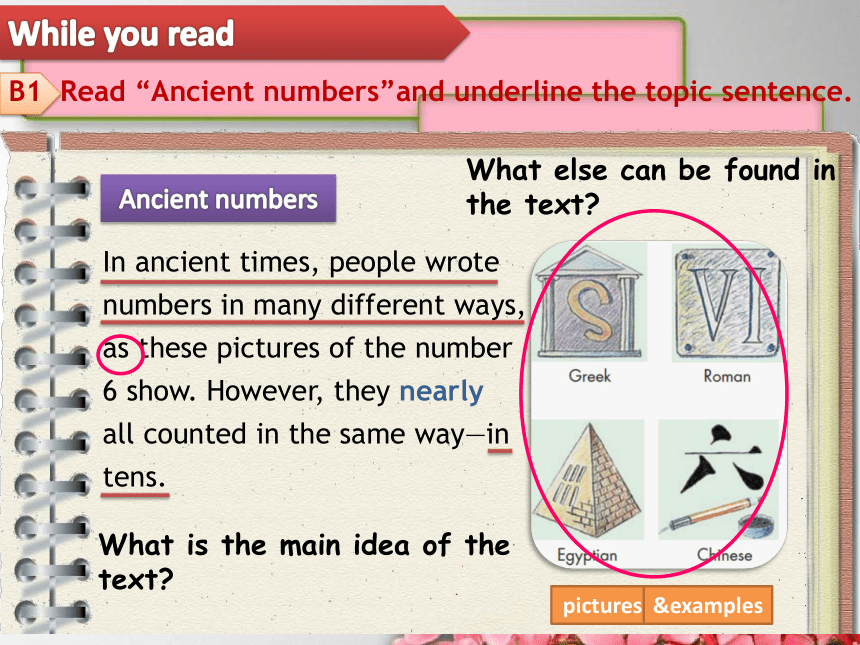
文档简介
(共16张PPT)
2
4
Amazing things
Numbers
Reading
Before you read
Why do we use machines to help us with mathematics
What inveutions are mentioned in the video clip
A0 Watch a video,then answer the questions.
Because we can't calculate all maths problems ourselves.
Numbers and systems like abacuses, electronic calculators and computers.
Who invented and developed the number zero
What is the most basic non-clcctric calculator
What does an electronic calculator allow us to do
What is the advantage of a computer
What is the video clip mainly about
It's about_______________that make working with numbers easier.
The Indians.
An abacus
It allows us to do all kinds of calculations
It can solve complex problems in a flash.
systems/inventions
Before you read
A0 Watch a video,then answer the questions.
Before you read
A1 Think and answer the questions according to last class
What is the main purpose of the text
a) To inform (告知)
b) To entertain (娱乐)
c) To persuade (劝说)
Where can you probably find this article
What type of text is this
a) Narration
b) Exposition
c) Argumention
In a history, math or science textbook, a magazine or on a website.
subheadings
pictures
Before you read
Subheadings divide the text into parts and tell the topic of each section.
A1 Think and answer the questions according to last class
direct and to the point 紧扣主题
interesting
short and clear
consistent一致性
What makes good subheadings
e.g. asking a question
length
structure
Ancient numbers
Zero
Calculating machines
Brain against computer
Are these good subheadings
While you read
B0 Think and answer the questions according to last class
To grab the main idea ,what’s the second imporatant part
subheadings
Ancient numbers
A topic sentence
A topic sentence is the most important sentence in a paragraph.
It summarizes the information in the paragraph.
While you read
B1 Read “Ancient numbers”and underline the topic sentence.
In ancient times, people wrote numbers in many different ways, as these pictures of the number 6 show. However, they nearly all counted in the same way—in tens.
Ancient numbers
What else can be found in the text
What is the main idea of the text
pictures
&examples
Zero
Most of us use the system of numbers with numbers from 1 to 9 and 0 (zero). With these ten numbers, we can write any number from the biggest to the smallest. The Indians first invented and developed the 1 to 9 system of numbers. They then invented the zero. This was a very important invention because it made it easier to write big numbers and to calculate.
While you read
B2 Read “Zero” and underline the topic sentence.
What’s the use of this part
reasons
facts&
Can you divide it further
While you read
B3 Read “Calculating machines”and underline the topic sentence.
Calculating machines
One of the first calculating machines was an abacus. Abacuses are so fast and accurate that people still use them today.
A modern electronic calculator can add, subtract, multiply and divide. It can also calculate percentages and square roots.
Computers are very powerful calculating machines. In a flash, a computer can do a calculation that you could not do in your whole lifetime.
examples
Can you find anything common in each part
of calculating machines
What’s the rest of the text about
descriptions
With these ten numbers, we can write any number from the biggest to the smallest.
Brain against computer
Some people call the brain a living computer. Is a human brain a more powerful calculator than a computer The following story may give an answer.
Shakuntala Devi is a lady from India with an amazing brain. Shakuntala and a very powerful computer were given this problem to solve.Shakuntala’s brain took fifty seconds to find the answer, like lightning. The computer took a minute. However, someone had to first program the computer with instructions, and that took many hours. No one had to program Shakuntala!
Use your own living computer to solve the problem above. If it is not powerful enough, you will find the answer on page 67.
While you read
B4 Read “Brain against computer"and underline the topic sentence.
What’s the writer's opinion
How does he/she prove it
is
By telling a story.
anecdote
n
comparison & contrast
differences
differences
similarities
Venn diagram
powerful
fifty seconds to find the answer
calculating fast
No one had to program Shakuntala!
someone had to first program the computer with instructions, and that took many hours.
Shakuntala’s brain
The computer's “brain”
B3 Compare and contrast.
While you read
What’s the diagram that can make making comprison easier
one minute to find the answer
Summary
C0 Think about what we have learned today
Ancient numbers
Zero
Calculating machines
Brain against computer
play an important role in holding readers' attention.
direct and to the point 紧扣主题
interesting
short and clear
consistent一致性
What makes good subheadings
length
structure
Subheadings
Summary
C0 Think about what we have learned today
divide the text into the parts and tell the topics
direct to the point
interesting
What makes good subheadings
length
Subheadings
summarizes the information in the paragraph.
short and clear
consistent
A topic sentence
structure
Ancient numbers
Zero
Calculating machines
Brain against computer
Are all the subheadings closely related to the title
More Practise
C1 Read the following questions and think.
Did people count numbers in the same way long ago
How widely are numbers used in different fields around the world
Was the system of numbers in the past different from the one we use today
How do people do calculations
Do the numbers in different countries always look the same
Why do people see numbers as an international language
How do numbers help people to communicate with each other better
What are the examples of numbers being used in the same way around the world
×
×
×
Are all the answered questions closely related to the title “Numbers: Everyone's language”
Summary
C0 List all the Descriptive methods that we learned today
Ancient numbers
Zero
Calculating machines
Brain against computer
pictures
&examples
reasons
facts&
&examples
descriptions
comparison & contrast
Supporting details
After you read
Suppose the competition took place now, would it be possible for a genius like Shakuntala to beat a computer
Do you think computers will be smarter than humans in the fiiture
C1 Think and answer the question.
2
4
Amazing things
Numbers
Reading
Before you read
Why do we use machines to help us with mathematics
What inveutions are mentioned in the video clip
A0 Watch a video,then answer the questions.
Because we can't calculate all maths problems ourselves.
Numbers and systems like abacuses, electronic calculators and computers.
Who invented and developed the number zero
What is the most basic non-clcctric calculator
What does an electronic calculator allow us to do
What is the advantage of a computer
What is the video clip mainly about
It's about_______________that make working with numbers easier.
The Indians.
An abacus
It allows us to do all kinds of calculations
It can solve complex problems in a flash.
systems/inventions
Before you read
A0 Watch a video,then answer the questions.
Before you read
A1 Think and answer the questions according to last class
What is the main purpose of the text
a) To inform (告知)
b) To entertain (娱乐)
c) To persuade (劝说)
Where can you probably find this article
What type of text is this
a) Narration
b) Exposition
c) Argumention
In a history, math or science textbook, a magazine or on a website.
subheadings
pictures
Before you read
Subheadings divide the text into parts and tell the topic of each section.
A1 Think and answer the questions according to last class
direct and to the point 紧扣主题
interesting
short and clear
consistent一致性
What makes good subheadings
e.g. asking a question
length
structure
Ancient numbers
Zero
Calculating machines
Brain against computer
Are these good subheadings
While you read
B0 Think and answer the questions according to last class
To grab the main idea ,what’s the second imporatant part
subheadings
Ancient numbers
A topic sentence
A topic sentence is the most important sentence in a paragraph.
It summarizes the information in the paragraph.
While you read
B1 Read “Ancient numbers”and underline the topic sentence.
In ancient times, people wrote numbers in many different ways, as these pictures of the number 6 show. However, they nearly all counted in the same way—in tens.
Ancient numbers
What else can be found in the text
What is the main idea of the text
pictures
&examples
Zero
Most of us use the system of numbers with numbers from 1 to 9 and 0 (zero). With these ten numbers, we can write any number from the biggest to the smallest. The Indians first invented and developed the 1 to 9 system of numbers. They then invented the zero. This was a very important invention because it made it easier to write big numbers and to calculate.
While you read
B2 Read “Zero” and underline the topic sentence.
What’s the use of this part
reasons
facts&
Can you divide it further
While you read
B3 Read “Calculating machines”and underline the topic sentence.
Calculating machines
One of the first calculating machines was an abacus. Abacuses are so fast and accurate that people still use them today.
A modern electronic calculator can add, subtract, multiply and divide. It can also calculate percentages and square roots.
Computers are very powerful calculating machines. In a flash, a computer can do a calculation that you could not do in your whole lifetime.
examples
Can you find anything common in each part
of calculating machines
What’s the rest of the text about
descriptions
With these ten numbers, we can write any number from the biggest to the smallest.
Brain against computer
Some people call the brain a living computer. Is a human brain a more powerful calculator than a computer The following story may give an answer.
Shakuntala Devi is a lady from India with an amazing brain. Shakuntala and a very powerful computer were given this problem to solve.Shakuntala’s brain took fifty seconds to find the answer, like lightning. The computer took a minute. However, someone had to first program the computer with instructions, and that took many hours. No one had to program Shakuntala!
Use your own living computer to solve the problem above. If it is not powerful enough, you will find the answer on page 67.
While you read
B4 Read “Brain against computer"and underline the topic sentence.
What’s the writer's opinion
How does he/she prove it
is
By telling a story.
anecdote
n
comparison & contrast
differences
differences
similarities
Venn diagram
powerful
fifty seconds to find the answer
calculating fast
No one had to program Shakuntala!
someone had to first program the computer with instructions, and that took many hours.
Shakuntala’s brain
The computer's “brain”
B3 Compare and contrast.
While you read
What’s the diagram that can make making comprison easier
one minute to find the answer
Summary
C0 Think about what we have learned today
Ancient numbers
Zero
Calculating machines
Brain against computer
play an important role in holding readers' attention.
direct and to the point 紧扣主题
interesting
short and clear
consistent一致性
What makes good subheadings
length
structure
Subheadings
Summary
C0 Think about what we have learned today
divide the text into the parts and tell the topics
direct to the point
interesting
What makes good subheadings
length
Subheadings
summarizes the information in the paragraph.
short and clear
consistent
A topic sentence
structure
Ancient numbers
Zero
Calculating machines
Brain against computer
Are all the subheadings closely related to the title
More Practise
C1 Read the following questions and think.
Did people count numbers in the same way long ago
How widely are numbers used in different fields around the world
Was the system of numbers in the past different from the one we use today
How do people do calculations
Do the numbers in different countries always look the same
Why do people see numbers as an international language
How do numbers help people to communicate with each other better
What are the examples of numbers being used in the same way around the world
×
×
×
Are all the answered questions closely related to the title “Numbers: Everyone's language”
Summary
C0 List all the Descriptive methods that we learned today
Ancient numbers
Zero
Calculating machines
Brain against computer
pictures
&examples
reasons
facts&
&examples
descriptions
comparison & contrast
Supporting details
After you read
Suppose the competition took place now, would it be possible for a genius like Shakuntala to beat a computer
Do you think computers will be smarter than humans in the fiiture
C1 Think and answer the question.
